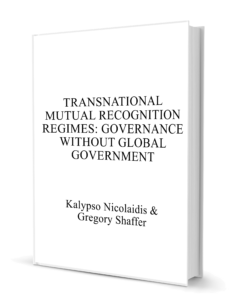
Kalypso Nicolaidis & Gregory Shaffer
Read PDFRead PDFScholars of globalization and international and transnational governance are putting forth a growing number of conceptual frameworks to examine and address issues of law and global governance. These frameworks include constitutional, contract, and (now) global administrative law constructs. As the framing paper in this symposium issue defines it, “global administrative law” comprises “the mechanisms, principles, practices and supporting social understandings that promote or otherwise affect the accountability of global administrative bodies, in particular by ensuring they meet adequate standards of transparency, participation, reasoned decision and legality, and by providing effective review of the rules and decisions they make.” This article discusses managed mutual recognition regimes within a global administrative law framework, although, as will be seen, it often uses the term “transnational administrative law” (or “transnational governance”) because of the horizontal, trans-governmental character of mutual recognition regimes. This article argues that transnational mutual recognition regimes are not simply one option among many available in the palette of global administrative law, but rather a core element of any global governance regime that eschews global government. The diffusion of mutual recognition regimes partakes in shaping a system of global subsidiarity that rejects (or at least does not unquestionably accept) the temptations of centralization and hierarchical constitutionalization of global economic relations.



